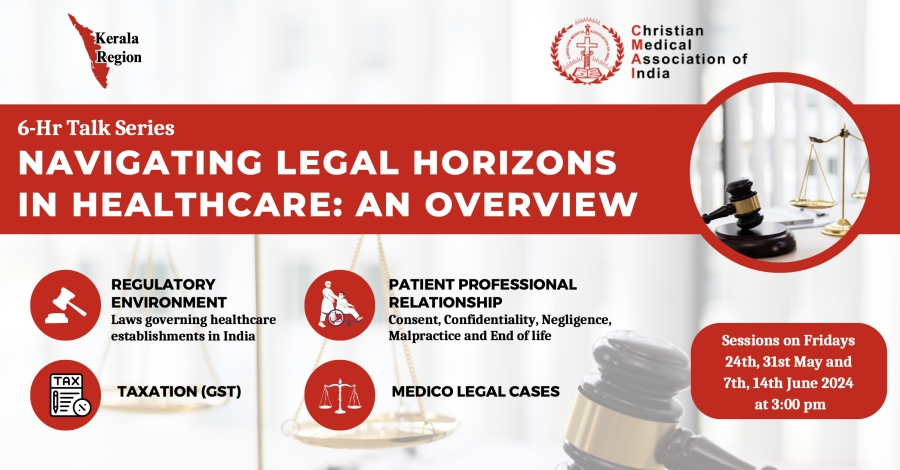The CMAI Kerala Region organized a webinar series titled "Navigating Legal Horizons in Healthcare: An Overview." This series comprised four sessions, held on consecutive Fridays from May 24, 2024, to June 14, 2024. A total of 46 members from 33 institutions participated. The sessions covered various legal aspects relevant to healthcare, aiming to enhance participants' understanding of the regulatory, taxation, ethical, and medico-legal issues in the healthcare sector.
The first session, held on May 24, 2024, was presented by Ms. Rosy Marcel, the Kerala Regional Secretary. Ms. Marcel provided an in-depth look into the regulatory environment for healthcare establishments in India. She covered fundamental constitutional rights related to healthcare, including the Right to Life and Health, the Right to Privacy as established in the landmark K.S. Puttaswamy vs. Union of India case, and other essential rights like emergency care, access to medicines, and health insurance. Additionally, she discussed various healthcare legislation such as the Clinical Establishments Act, the Drugs and Cosmetics Act, and the Mental Health Care Act 2017, alongside the roles of regulatory councils like the National Medical Commission and the Indian Nursing Council.
On May 31, 2024, Mr. Aji Jacob, Finance Manager at BCMCH Thiruvalla, presented the second session, focusing on the Goods and Services Tax (GST) in India. Mr. Jacob explained GST's implementation as a comprehensive, multi-stage, destination-based tax system replacing various indirect taxes. He highlighted its impact on the healthcare industry, noting that essential healthcare services remain exempt to maintain affordability. Despite initial challenges like increased compliance costs, GST's benefits include increased transparency, higher tax compliance, and improved logistics efficiency, making India an attractive destination for foreign investments.
The third session, conducted on June 7, 2024, was led by Maj. Beena C. A., Chief Nursing Officer at Baby Memorial Hospital. She focused on the intricate balance of legal, ethical, and moral obligations in the healthcare profession, particularly in the patient-professional relationship. Maj. Beena delved into various facets of the legal system, emphasizing the importance of understanding laws that govern medical practice to avoid medico-legal issues. Key principles discussed included autonomy, beneficence, non-maleficence, justice, and fidelity, which are foundational to ethical nursing practice. The session also stressed the role of nurses in ensuring patient rights, maintaining confidentiality, and the critical need for accurate documentation to protect both patients and healthcare providers. By exploring common legal pitfalls and providing
guidelines for safe practice, the webinar aimed to equip nursing professionals with the knowledge to navigate legal responsibilities and uphold high standards of patient care.
The fourth and final session, held on June 14, 2024, focused on Medico Legal Cases and was again led by Ms. Rosy Marcel. This session aimed to enhance understanding among healthcare professionals regarding the intersection of medicine and law, particularly through real-life examples. Ms. Marcel emphasized the importance of medico-legal reporting, detailing doctors' duties, potential medico-legal cases, and the necessary course of action. Key topics included the legal responsibilities of doctors, the types of cases that require medico-legal attention, and the procedures for reporting and documentation. The session also covered the implications of non-reporting under Indian law. Real-life case studies highlighted various scenarios, including injuries from accidents, suspected criminal activities, and cases of domestic violence. The discussion extended to malpractice, negligence, financial disputes, and strategies for safeguarding interests in the healthcare setting. This session was integral in raising awareness and equipping healthcare professionals with the knowledge to navigate the complexities of medico-legal cases effectively.



